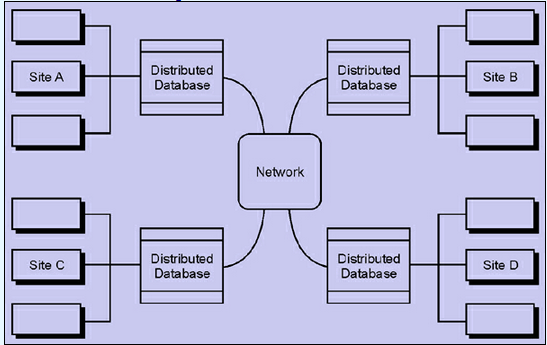Distributed Databases:
Many organizations replicate and distribute copies or parts of databases to network servers at various sites. These distributed databases reside on network servers on the World Wide Web, on corporate intranets or extranets, or on other company networks.

A distributed database is a database that comprises two or more data files which are placed at various sites on a computer network. It is a single logical database that is physically distributed across computers on a network. The users feel that the entire database is at their location and are unaware of the replication of the data that happens behind the scenes.
The computers in a distributed system communicate with one another through various communication media, such as high-speed networks and telephone lines. They do not share the main memory or disks. The computers in a distributed system may vary in size and function, ranging from workstations to mainframe systems. These computers are called sites or nodes. Each site is an independent database system. A distributed database can be regarded as a partnership among individual DBMSs at different sites to enable the user to have clear access to the data anywhere in the network.
In a distributed database system, there is a difference between local and global transactions. A local transaction accesses data only at the site at which the transaction was initiated. A global transaction, however, either accesses data at a site different from the one at which the transaction was initiated or accesses data from different sites.
All the distributed databases are controlled by a centralized distributed database management system (DDBMS). In a DDBMS, the storage devices are not connected to a common CPU. Data is stored on multiple computers that are located either at the same location or are scattered over a network of computers that are interconnected. The DDBMS periodically synchronizes all the data located in the databases. It ensures that any modifications made to the data from a particular location are automatically reflected in the data stored at other locations on the computer network.
A distributed database has many advantages: data can be shared; each site can retain a degree of control over data; if one site fails, the remaining sites can continue to operate; and it is economical to maintain.
Email based Information technology and system assignment help - homework help at Expertsmind
Are you searching Computer science expert for help with Distributed Databases questions? Distributed Databases topic is not easier to learn without external help? We at www.expertsmind.com offer finest service of Information technolgy and system assignment help and Information technology homework help. Live tutors are available for 24x7 hours helping students in their Distributed Databases related problems. We provide step by step Distributed Databases question's answers with 100% plagiarism free content. We prepare quality content and notes for Distributed Databases topic under Information technology theory and study material. These are avail for subscribed users and they can get advantages anytime.
Why Expertsmind for assignment help
- Higher degree holder and experienced experts network
- Punctuality and responsibility of work
- Quality solution with 100% plagiarism free answers
- Time on Delivery
- Privacy of information and details
- Excellence in solving Information Technolgoy and system queries in excels and word format.
- Best tutoring assistance 24x7 hours